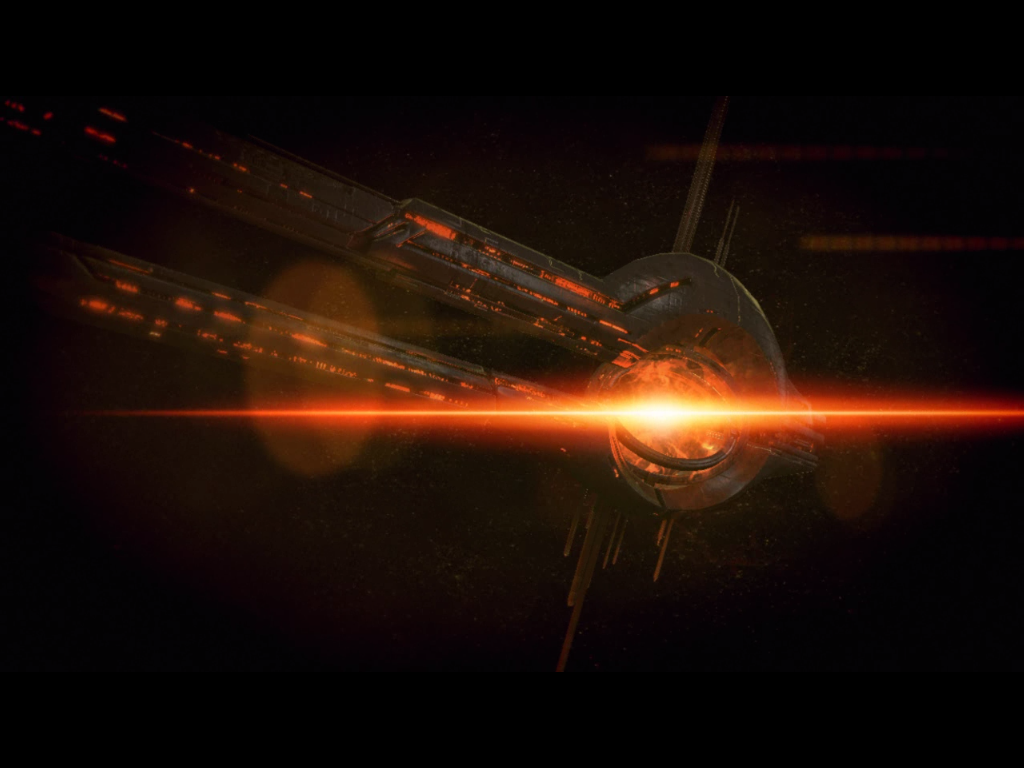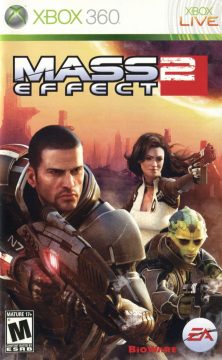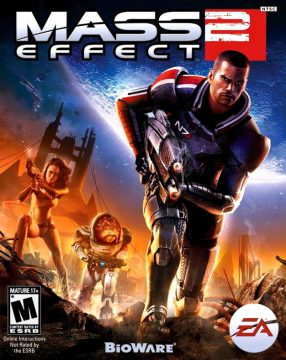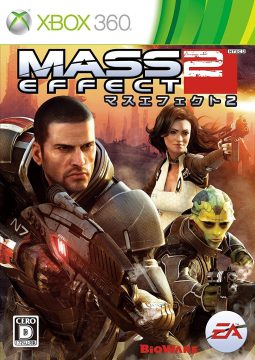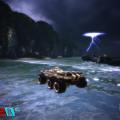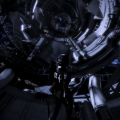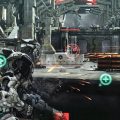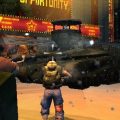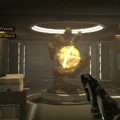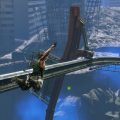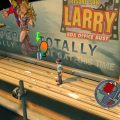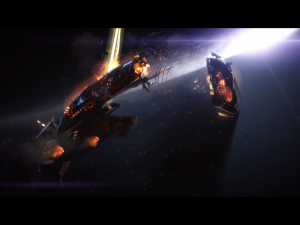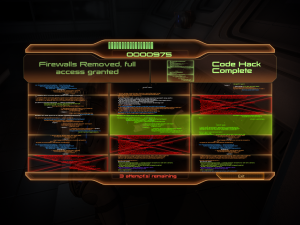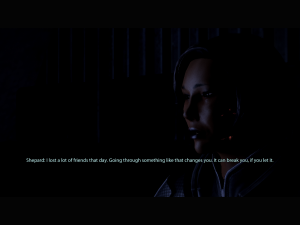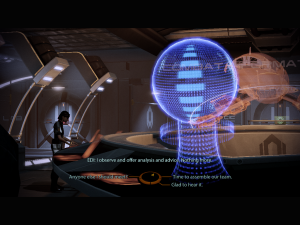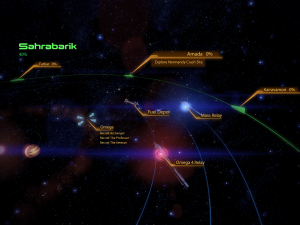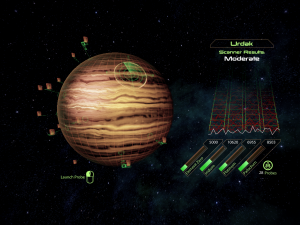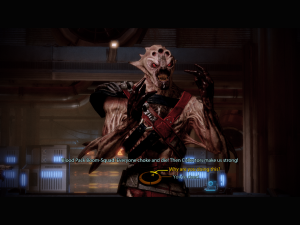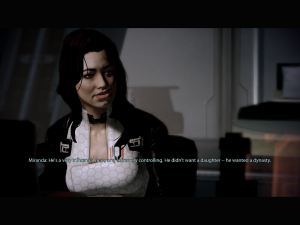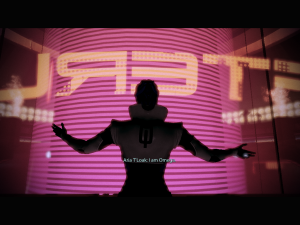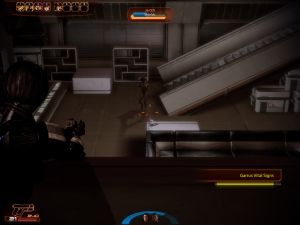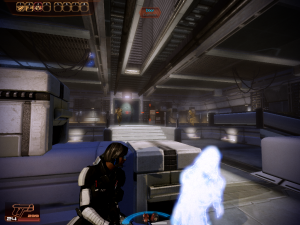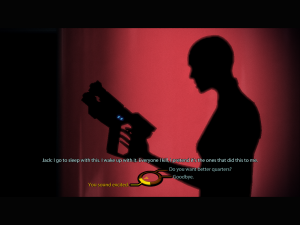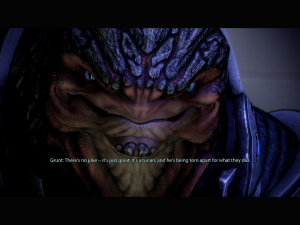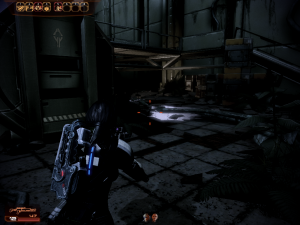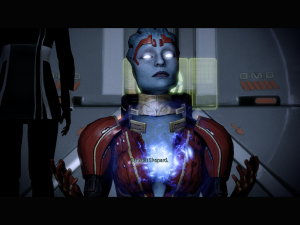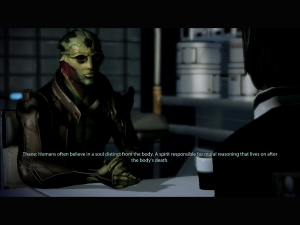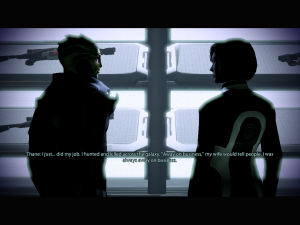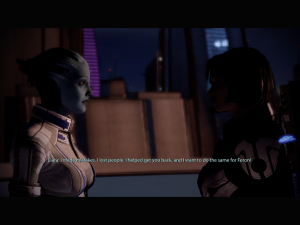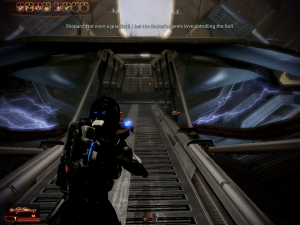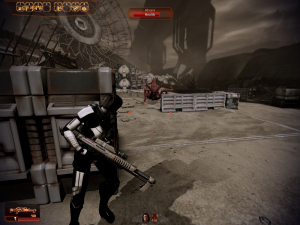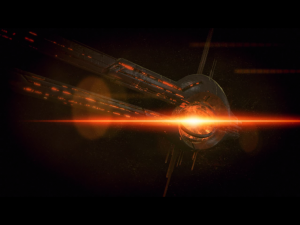Mass Effect was a game changer, but not the game that set the world on fire. No, that honor goes to Mass Effect 2, arguably the single best game Bioware has ever developed, and by far their best received. Right off the bat, the game throws out all expectations, taking place a few months after the first game. Saren was defeated, but the Reapers are still coming, and just one managed to nearly destroy the Citadel, the center of the galactic community. Shepard’s crew is exploring geth sightings when a mystery ship blasts through the Normandy like a hot knife through butter. After a tense opening where Shepard and friends try to save as much of the crew as possible, Shepard ends up floating out in space and burning up in a nearby planet’s atmosphere, all while their suit runs out of air. Two years later, Shepard awakens in a base belonging to Cerberus, a human first terrorist organization briefly brought up in the last game. They have rebuilt Shepard because they are the only ally they have left. The Reapers are coming, and every galactic power refuses to believe the threat is real. On top of that, a horrific race called the Collectors are abducting human colonies on the edges of the galaxy in mass, and they may be related to the Reapers. Shepard has no choice but to go along with Cerberus for now and gather a team of specialists to go on a mission beyond the Omega-4 relay and stop the Collectors once and for all. Alongside the returning Garrus and Tali (now romance options for the Shepard of the opposite sex), the team of twelve includes…

Miranda Lawson: The Cerberus scientist who put Shepard back together. Egotistical and pragmatic, Miranda is the product of her father’s genetic engineering, though she’s no fan of the man otherwise, and that past is why she joined Cerberus. She’s a solid biotic with the shield destroying overload skill. Can be romanced by a male Shepard. Her and Jacob originally came from a now taken down mobile tie-in called Mass Effect Galaxy, which had a graphic novel art style.
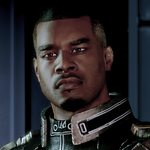
Jacob Taylor: Former Alliance special agent turned Cerberus security. Jacob joined because nobody else was acting fast enough for his tastes, bringing his support biotics and combat skills to the table. He’s the most put together and straight laced of the group, though this leaves him as the dullest of the squad. Can be romanced by a female Shepard, but he gets a new girlfriend in the next game anyways if he survives this one.
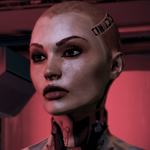
Jack: Subject Zero, an ultra powerful biotic who’s been causing trouble across the galaxy. When you recruit her, she destroys an entire high security prison by herself, cussing you out the whole way. Has a whole mess of demons and brings the crowd clearing shockwave skill. Can be romanced by a male Shepard.
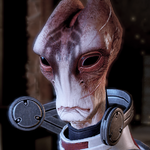
Mordin Solus: A salarian biologist and researcher who runs a clinic on the criminal asteroid city of Omega, though he once helped prolong the genophage when he was a member of a special forces unit, something he does feel guilt for. Has a lot of projectile powers good for organic enemies and runs the research department on the Normandy SR-2.
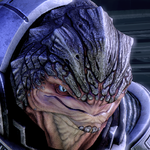
Grunt: A so called “pure” krogan born from genetic engineering by the krogan scientist Okeer, he wants to understand what it means to be krogan. He’s violent and fun-loving, with damage dealing skills and a ton of health, made even more useful by his fortification skill.
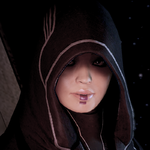
Kasumi Goto: One of the two DLC characters, a world class thief who wants help collecting her ex-partner’s black box. She has a cloaking power she uses to perform sneak attacks on enemies for big damage, plus a flash bang to keep them confused.
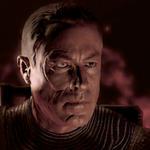
Zaeed Massani: The other DLC character, currently a bounty hunter, but formally the founder of the Blue Suns mercenary gang. He’s a whirlwind of destruction who makes for a poor leader, but great muscle. Has nasty inferno grenades that can deal a lot of damage to a lot of enemies fast.
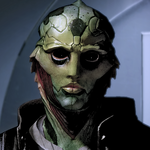
Thane Krios: A drell assassin, and one of the best. Despite the profession, he’s very kind hearted and religious, trying to do good before his coming death due to a terminal illness. Oddly, is a balanced biotic who can use shredder ammo. Can be romanced by a female Shepard.
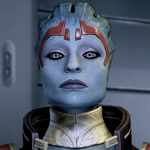
Samara: An asari Justicar, sort of like the Asari Jedi but much, much more violent and with an even more restrictive code. She’s also a mother of three, but all of her children have an affliction that makes them effectively succubi. She joins on the condition you help her kill one of her daughters, who has become a serial killer. The most powerful biotic of the group and romanceable by male and female Shepards, though her code stops her from taking things that far.
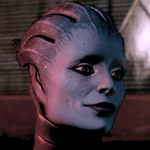
Morinth: Samara’s runaway daughter, a sadistic killer you can recruit if you pick her over her mother on Samara’s loyalty mission. Has the dominate ability, the organic version of AI hacking. Also, trying to romance her results in a non-standard game over, what with the death bringing succubus thing going on.
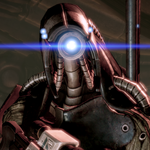
Legion: The last party member you can get if you aim to get everyone, Legion is a geth who saves Shepard’s life during a mission in a reaper corpse and has a piece of their old armor sown into their body. A talented sniper, one of the most durable characters, a master of AI hacking, and the first glimpse of geth culture in the whole series.
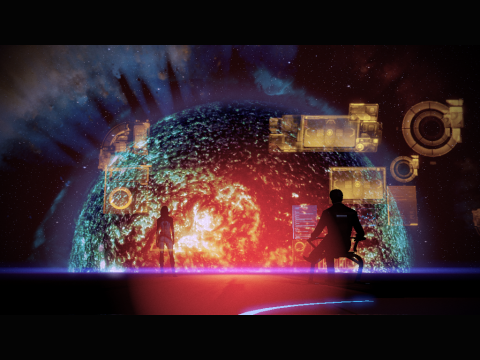
This shift in focus from a man hunt to a recruitment drive was one of the best ideas the team could have ever had. Bioware suffers a bit when it comes to making engaging plots or playing with theme, but they have a good understanding of character. Mass Effect 2 is almost entirely a string of character missions, with eight recruitment missions and twelve loyalty missions, all of them focusing on a single member of your squad. Everyone gets development, even the two DLC characters, and the main plot moving slow instantly becomes forgivable with how enjoyable it just is to talk with these people. Every mission has a new angle, and occasionally a new genre spin, ranging from murder mystery, a tower siege, and even a heist with dialog puzzles. There’s always something new to experience, with the main story popping up after making a set amount of progress.
All of the story DLC is also fantastic. Zaeed and Kasumi have great character missions, while Overlord, Arrival, and Lair of the Shadow Broker all offer something new the main game lacks. Overlord has some inventive horror elements, Arrival introduces a stealth section and a tense solo mission, and Lair of the Shadow Broker has some of the best bosses in the series. It also adds Liara as a guest party member, explaining what she’s been up to and giving her depth and complexity she didn’t have in the first game, going from wallflower to hardened and manipulative information broker. With the added DLC, Mass Effect 2 is more like an episodic TV series than an arc structured story, and it benefits greatly from this shift in focus. This also allows for a ton more world building, a new selection of races, and a wide variety of enemy types.
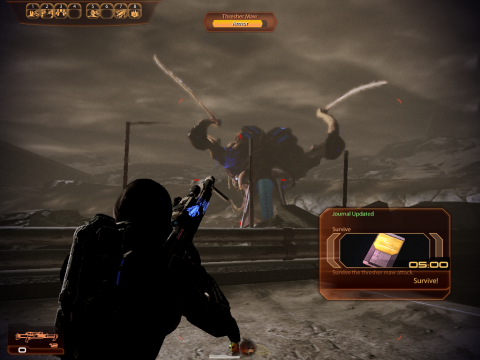
The design shift sacrifices the broken but fun mechanics of the original game, but it trades it all in for a smooth and rewarding squad shooter. Granted, Mass Effect was already this, but commands rarely worked. Now, it’s a breeze to command your team, and the strength of the new enemies and their defensive options makes the strategy elements absolutely necessary to progress. It’s good fun to see a plan come together, or to think your way out of a bad situation, and all of Shepard’s classes have been expanded upon and fleshed out in new and exciting ways. Instead of just specialization differences, every class has exclusive skills and uses. The Vanguard is a new monster with the melee charge skill that turns Shepard into a living bullet, Infiltrator gives the wildly useful cloaking power, Sentinel has self-explosive tech armor, and all the base classes make great use of their skill pool. No longer do you have to put points into a weapon to use it, everyone instead has two base powers, a stat booster branch, and a loyalty power after doing their loyalty mission. Shepard can also learn one loyalty power once a squad member unlocks theirs, which can give all sorts of new options. Even the ammo system has been changed to limited ammo and clips, but it works better for the flow of combat. There’s even new heavy weapons, for when you need to clear the field fast.
There are still bugs not worked out, though. The game is focused on cover based combat, which causes some problems with powers. Unlike your squad, Shepard has to use grenade and projectile powers in a way that causes them to launch in a given arc, which can be a tad awkward when enemies also have cover. Incinerate is especially useless when cover is involved, do to its curving arc, often just landing right into a wall unless you angle Shepard’s position just right. There’s also weird event loading issues, where the game may forget an entire event, though a quick reload easily solves the problem.
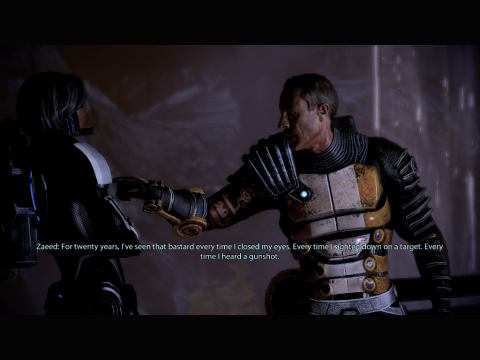
There’s also been a change in the galactic map. Instead of an easy select and go set-up with a handful of planets to explore for materials and side assignment goals in the wonky but fun Mako, the new Normandy has to be moved around manually, and planet exploration has been replaced with the much faster but far less interesting probe system. You scan a planet, then shoot a probe when you find a thing of interest or a pool of resources. That is it. While side assignments now have original maps instead of the same repeating three or four over and over, they feel oddly incomplete, shown most awkwardly with one where you stop Batarian terrorists (in a call back to the first game’s Bring Down the Sky DLC) and make a tough choice that undercuts everything by a lack of Shepard and the crew having lines or facial animation.
As for the choice system, it has widened the gap between paragon and renegade – and will punish you for not playing primarily as one or the other. There are two inner-squad fights that can only be solved with super high paragon or renegade levels, and if you don’t solve it, one squad member loses their loyalty towards you. What this means is that they’re most likely going to end up dying in the final suicide mission, so if you want to get everyone out, you have to solve these conflicts, so you need to stick almost exclusively with one path. However, the interrupt system makes cutscenes even more engaging, giving you paragon or renegade options you can pick that changes how a scene plays out in the moment. The renegade ones are also hilarious (sure, just throw a random person out a window).
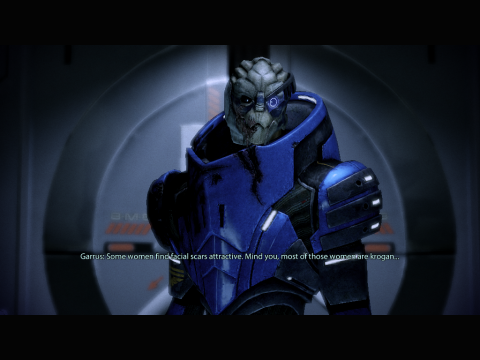
The ship management elements are minor and can be easily handled so as to avoid losing members during the suicide mission because of ship failures. Squad management is also minor due to an odd lack of weapons to find. Money is finite (rewarded with scavenging and completing missions), but is now how you do most of the stat boosting, with weapon skill upgrades and new armor pieces to buy. The structure of a good, involved sim is there, like in the DS RPG Infinite Space, but it’s not fleshed out at all, just serving to connect the player more to the goals of Shepard to keep everyone alive and accomplish the mission. It’s not bad, but it could have been more.
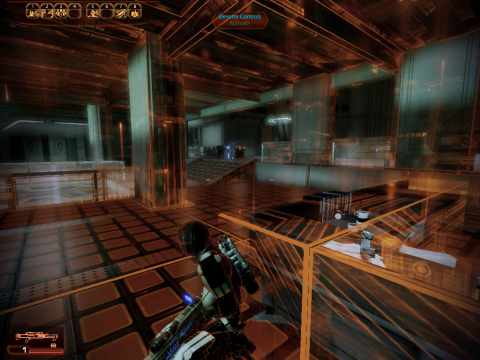
Mass Effect 2‘s issues, however, are all mostly nitpicks. The game manages to be exactly what it set out to be, with a whole mess of polish the original game never had. On top of that, the character writing is some of the best Bioware has ever had, and structuring the game entirely around it was one of the wisest decisions possible. Mass Effect 2 isn’t that much of an RPG, but the maze of cause and effect and RPG elements that enhance the shooting mechanics more than make up for it. The game is effectively a masterpiece, but that level of quality lead to heightened expectations the third game couldn’t hope to fulfill.
